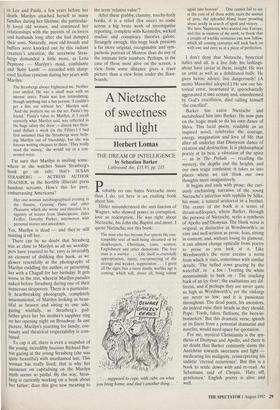A Nietzsche of sweetness and light
Herbert Lomas
THE DREAM OF INTELLIGENCE by Sebastian Barker Littlewood Arc, £15.95, pp. 215 Probably no one hates Nietzsche more than I do, yet here is an exalting book about him.
Hitler misunderstood the anti-fascism of Wagner, who showed power as corruption, love as redemption. He was right about Nietzsche, his John the Baptist and more. I quote Nietzsche, not this book:
The man who has become free spurns the con- temptible sort of well-being dreamed of by shopkeepers, Christians, cows, women, Englishmen and other democrats. The free man is a warrior . . . Life itself is essentially appropriation, injury, overpowering of the strange and weaker, suppression . . . I greet all the signs that a more manly, warlike age is coming, which will, above all, bring valour supposed to cope, with cubs, on what you bring home, and that's another thing. . . ' again into honour! ... One cannot fail to see at the core of all these noble races the animal of prey, the splendid blond beast prowling about avidly in search of spoil and victory.. . We have Napoleon, who wanted one Europe, and this as mistress of the earth, to thank that a couple of warlike centuries can now follow, which all coming centuries will look back on with awe and envy as at a piece of perfection.
I don't deny that Nietzsche, hysterical italics and all, is a live fish: his lashings- about have caviar in them, insight. He was an artist as well as a debilitated bully. He gives heroic advice: live dangerously! (A motto Mussolini adopted.) He saw our his- torical error, incarnated it, spirochaetally aggravated it into ecstasy and, unredeemed by God's crucifixion, died calling himself 'the crucified'.
Barker has eaten Nietzsche and metabolised him into Barker. He now puts on the tragic mask to do his own dance of Shiva. This lucid poem, readable as an inspired novel, celebrates the courage, energy, imagination and love of life that after all underlay that Dionysian dance of creation and destruction. It is philosophical poetry at its best, a vibration of the spirit — as in The Prelude — recalling the mystery, the depths and the heights, and our own tragic confusion: it takes us into places where we can think our own thoughts more imaginatively.
It begins and ends with prose: the curi- ously enchanting narrative of the young Nietzsche's infection with syphilis by Silka, his muse, a natural aristocrat in a brothel. The centre of the book is a series of dream-soliloquies, where Barker, through the persona of Nietzsche, seeks a synthesis of Apollo and Dionysus. The blank verse is original, as distinctive as Wordsworth's: as easy and well-written as prose, lean, strong in content; and, without losing its glamour, it can almost change optically from poetry to prose as you look at it. Like Wordsworth's the verse creates a norm from which it rises, sometimes with similar details: 'The belled cows grazing by the waterfall', or a fox / Trotting the white mountainside to bark on / The cracking back of an icy fiver'; the exaltations are dif- ferent, and if perhaps they are never quite so high as Wordsworth's, yet the sinkings are never so low; and it is passionate throughout. The dead poets, his ancestors, do indeed raise their heads as they should. Pope: 'Fools, fakes, flatfoots, the bees-in- bonneters.' But this dramatic verse, speech at its finest from a potential dramatist and novelist, would need space for quotation.
For me, mystical Christianity is the syn- thesis of Dionysus and Apollo, and there is no doubt that Barker constantly slants the Antichrist towards sweetness and light medicating his malignity, reinterpreting his sadistic 'eternal recurrence'. But this is a book to settle down with and re-read. As Schumann said of Chopin, 'Hats off, gentlemen.' English poetry is alive and well.


















































 Previous page
Previous page